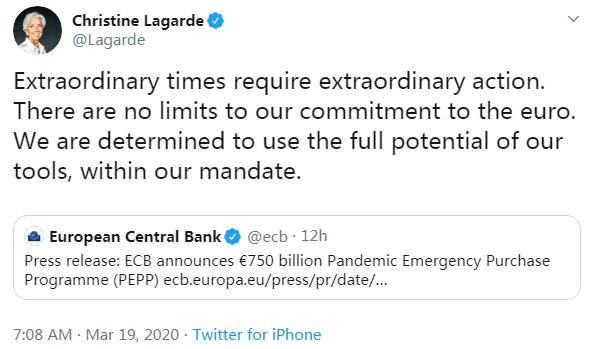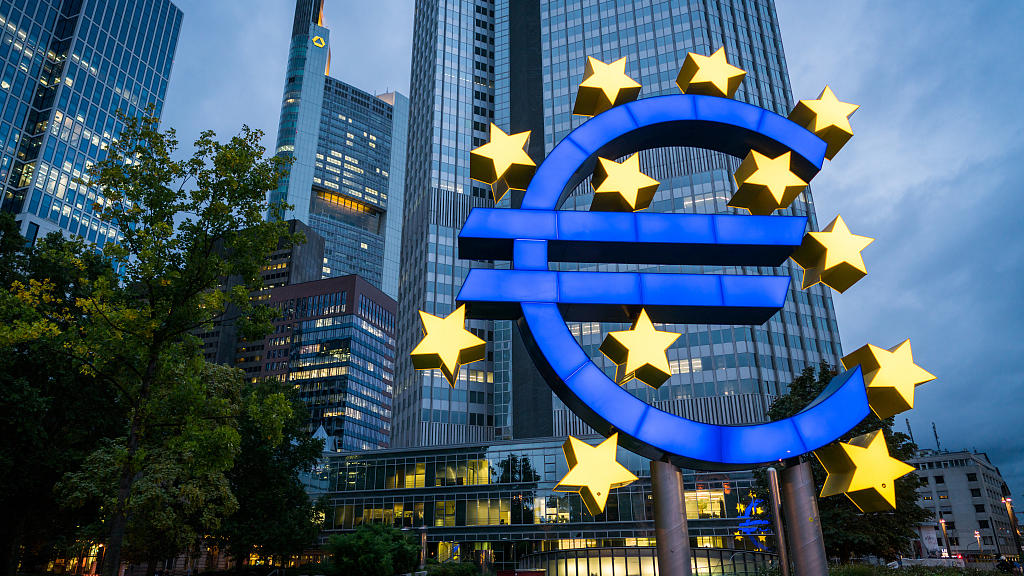Top European Union (EU) leaders on Thursday welcomed the European Central Bank (ECB)'s surprise 750-billion-euro (820 billion U.S. dollars) bond buying stimulus package and vowed they would do whatever it takes to protect the bloc's economy.
Brussels expects social and economic lockdowns imposed to contain the global coronavirus pandemic to have a devastating effect on business, and leaders are scrambling to reassure the markets.
Late Wednesday, the ECB unveiled a Pandemic Emergency Purchase Programme, an emergency scheme to pump cash into the economy by buying additional government and corporate bonds until a least the end of the year.
"Extraordinary times require extraordinary action," ECB President Christine Lagarde said on Twitter.

Screenshot of tweet by European Central Bank Christine Lagarde who announces an emergency 750-billion-euro scheme.
Screenshot of tweet by European Central Bank Christine Lagarde who announces an emergency 750-billion-euro scheme.
The ECB's bazooka was the latest in a string of measures by central banks and governments aimed at supporting the global economy, which have amounted to almost two trillion U.S. dollars.
"Europe is pursuing a forceful economic response to the Corona Crisis," tweeted Charles Michel, the president of the European Council, which represents EU member state governments.
"No efforts will be spared to contain #COVID19 and shield our economies from further damage. I welcome the Emergency Purchase Programme (PEPP) from the ECB. #WhateverItTakes."
The speaker of the European Parliament, which is considering holding a virtual session by video conference to vote on emergency measures, also deployed the same motivational hashtag.
"The ECB is securing the European economy by protecting families, workers and businesses," tweeted David Sassoli, whose debt-plagued native Italy is one of the most exposed EU member countries.
However, the measures have not been enough to soothe panic-stricken investors and analysts say more must be done. Soon after the ECB announcement, French President Emmanuel Macron called for more fiscal action from leaders.
Europe's stock markets rebounded on Thursday as investors digested the ECB move and Lagarde's promise that there "are no limits to our commitment to the euro."

European Central Bank's headquarters in Frankfurt, Germany. /VCG
European Central Bank's headquarters in Frankfurt, Germany. /VCG
Eurozone is 'cashing out'
Europe is now the epicenter of the COVID-19 pandemic and governments have scrambled to open the spending taps while closing their borders.
The eurozone bank is reviving crisis-era measures to encourage bank lending to companies, but caused some disquiet last week by keeping its borrowing rates on hold.
EU finance ministers pledged Monday to fight the coronavirus "war" but declined to tap the European Stability Mechanism, the eurozone's 410-billion-euro war chest.
Debate also began among eurozone members about creating "coronabonds," which would be the first time members break a taboo about pooling their debts.
Individual European countries have stepped up with their own plans, with German Chancellor Angela Merkel warning Wednesday that Germany faces its biggest test since World War II.
Berlin has unveiled 550 billion euros in government-backed loans "for starters," and suspended legal obligations for firms facing acute liquidity problems to file for bankruptcy.
British Finance Minister Rishi Sunak on Tuesday unveiled an "unprecedented package" of government-backed loans worth 330 billion British pounds (400 billion U.S. dollars).
Macron of France, which is now under total lockdown, said Monday the government would ensure that all bank loans to companies are backed by a state guarantee totaling 300 billion euros.
The French government announced a separate aid package worth 45 billion euros to help businesses and employees cope.
In hardest-hit Italy, the government promised to deliver a "very strong injection of liquidity" into the financial system to generate 340 billion euros (380 billion U.S. dollars) in cash flows.
Spain plans to guarantee up to 100 billion euros in corporate loans.